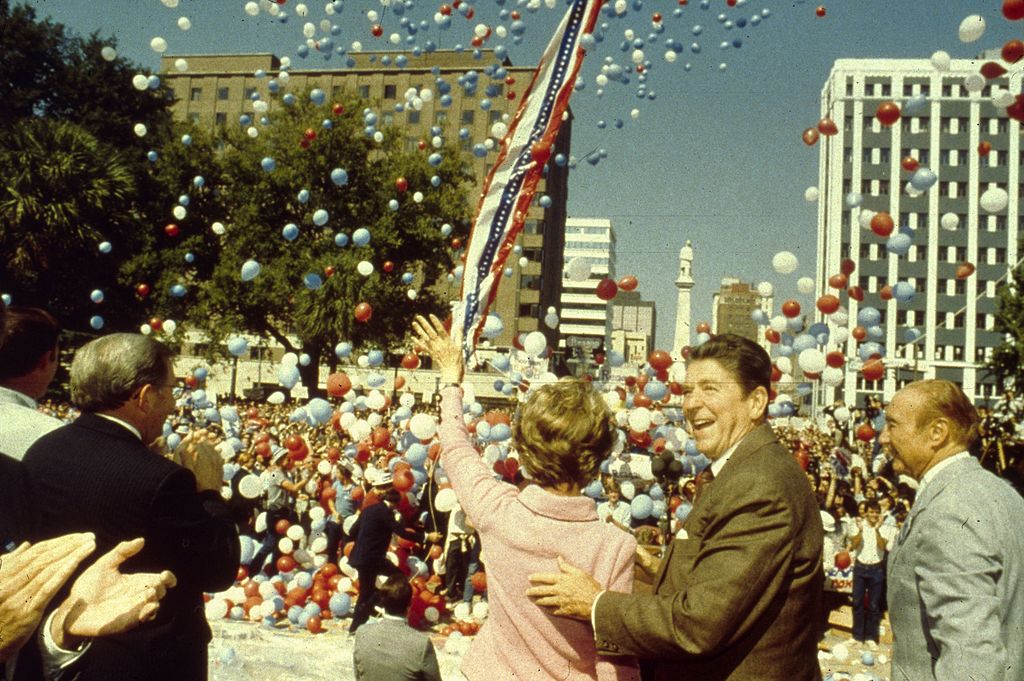Beyond Neoliberalism
America’s Democratic Decline Began Long Before Trump or COVID
How economic policies in the ’80s and ’90s destabilized American democracy today.

The Italian political philosopher Antonio Gramsci, who was imprisoned by Benito Mussolini and died in 1937, warned of the “morbid symptoms” that can arise in a society when one political order is dying while an alternative regime struggles to be born. Gary Gerstle, who is the Paul Mellon Professor of American History Emeritus and the Paul Mellon Director of Research in American History at the University of Cambridge, analyzes some of America’s morbid symptoms in his new book, The Rise and Fall of the Neoliberal Order: America and the World in the Free Market Era.
The surreal and grotesque quality of American politics, Gerstle argues, can be understood only in the context of both the longevity and now fracturing of neoliberal economics and ideology. Unregulated markets, unfettered globalization and extreme individualism cannot politically cohere in a way that brings our country together. Democracy is threatened, political rationality disappears, and bizarre belief systems capture the imagination of millions of Americans. Capital & Main talked with Gerstle about how we came to this impasse during his visit to the East Coast to promote his new book.
Note: This interview has been edited for length and clarity.
Capital & Main: How do you define neoliberalism, and how is it a useful analytical category for understanding our current economic, political and cultural environment?

Gary Gerstle.
Gary Gerstle: Neoliberalism is a creed that wants to unleash capitalism’s power and to free markets from constraints. The doctrine believes that markets, left to their own devices, can produce the greatest economic growth and thus the greatest economic good. It’s a creed that prizes the free movement of capital, goods, information, and people across all borders, with few or no constraints. It aspires to globalize capitalism and deregulate economies. It prizes innovation and disruption. Some who subscribe to the neoliberal creed also value the hybridization of cultures that comes from crossing borders. Cosmopolitanism is the word I attach to a celebration of different races, nationalities, and ethnicities mixing with each other.
And this differs from conservatism in what ways?
Conservatism, in classical terms, connotes a high regard for tradition, order and hierarchy, for continuing to do things the way they’ve always been done. There are profoundly conservative elements in American politics — witness white Southern reactions to the civil rights movement and efforts to turn back liberation movements undertaken by women, gays and racial minorities and to restore the priority of the patriarchal family, heterosexuality and white supremacy. But the term “conservatism” does not do a good job capturing the innovation and disruption that unleashing capitalism’s power entails.
You write that a political and economic order “extends political time” beyond just a particular election cycle. How do you define a political order?
Most discussion of American politics revolves around two-, four- and six-year political cycles. The concept of political orders looks at how certain tendencies in American politics come to be dominant in American politics over longer stretches of time — 30 to 40 years. For a political order to succeed, a political party must achieve enduring influence through a constellation of constituencies, policy networks, think tanks and media platforms, all harnessed to promote a particular ideology, especially in regard to political economy.
There was a Democratic Party-led New Deal order that arose in the 1930s and ’40s, crested in the 1950s and 1960s, and fell apart in the 1970s, and there was a Republican-led neoliberal order that emerged in the 1970s and ’80s, crested in the 1990s and 2000s, and has now fractured.
“One could argue that Clinton’s deregulatory policies went further than those of Reagan himself.”
Contrast the New Deal and neoliberal orders.
The core idea of the New Deal order was that capitalism left to its own devices was destructive and therefore had to be managed by a powerful federal state acting in the public interest. The core idea of the neoliberal order was that government restrictions and controls had to be stripped away and the animal spirits of markets released in order for capitalism to flourish. The ideological influence of an order is discernible not simply in the frequency of its triumphs at the polls but also in its ability to spread its core ideas through the ranks of the ostensible political opposition.
For instance, when Republican Dwight D. Eisenhower became president after 20 years of Democrats in power, he might have dismantled the New Deal. But he did not. Instead, he and the Republican Party accepted the core principles of the New Deal as their own.
You argue that the presidency of Bill Clinton was governed by the economic doctrine of Ronald Reagan.
I call Clinton the Democratic Eisenhower because during his presidency he spearheaded a campaign to get the Democratic Party to acquiesce to the core economic principles of Reaganism: deregulating the economy at home, notably in telecommunications, electricity, and finance, and globalizing the doctrine of free trade. One could argue that Clinton’s deregulatory policies went further than those of Reagan himself. Admittedly, Clinton was operating in a tough political environment. But this illustrates my point about political order: Once established, a political order constrains political choice and achievable policy options.
You place the fracturing of the New Deal order in the ’70s and ’80s. What led to that crack-up?
During the New Deal, white Southern Democrats were critical to passing progressive economic reforms; in return, they demanded Roosevelt not do anything to interfere with the racial hierarchy of the South. But the issue of racial segregation and inequality could only be ignored for so long. In the 1960s, Democrats had to choose between maintaining their Jim Crow base in the white South or embracing civil rights. They rightly choose the latter, but this cost them a critical constituency, weakening the potency of New Deal order. The ill-advised war in Vietnam weakened that order further, both by discrediting the Democrats’ foreign policy and by taking away resources from promised domestic reforms.
In the 1970s, these headwinds were strengthened by a dramatic change in the world economy. The economic recovery of Europe and Japan and the rise of commodity-producing nations, epitomized by OPEC taking control of oil production and pricing, ended a 30-year period in which American industry had dominated global capitalism. The United States entered a serious and long recession. The Keynesian tool kit used so effectively by Democratic economists for a generation was no longer working. This failure opened the door to the advocates of neoliberal deregulation. Their candidate was Ronald Reagan, who triumphed in 1980.
“Republicans understood the Cold War as a battle for hearts and minds: which system, the communist or capitalist one, would be able to deliver the best deal for the ordinary man or woman.”
Neoliberalism not only transforms the economy but also the culture and even the individual psyche. The self becomes a bundle of “assets” to be exploited.
Even the classical liberal Adam Smith believed there were realms of human existence that could not be understood in the terms of “man” as an economic being. Family, the education of children, and the cultivation of political virtue, for example, were areas of human endeavor that could not be understood in terms of economic inputs and outputs.
But some groups of modern-day neoliberals disagreed. Capital was not something that only corporations possessed; all individuals possessed what some neoliberal economists began to call “human capital” — mental and cultural resources that could and should be deployed to the best advantage. Thus began a campaign to measure the non-material resources that an individual possessed, with the goal of deploying those resources to maximize “efficiency” and “returns.” A kind of economistic thinking thus infiltrated the analysis of all kinds of human endeavor. We now count and measure everything that we do, and in the process we may be shrinking rather than enlarging our humanity.
You write that the “Cold War was the engine driving the mainstream Republican party to the left,” and that the “Cold War secured the New Deal order.” This obviously runs counter to what other historians have argued. Can you elaborate on the argument?
Absent the Cold War, the Republicans would have dismantled much of the New Deal in the late 1940s and 1950s, much as they had taken apart — in the 1920s — the large state apparatus that the Democrats, under Woodrow Wilson, had built up during the First World War. But Republicans feared communism even more than the Democrats did, which impelled them to sign on to a massive program of global containment. This meant supporting large military budgets, and high and progressive rates of taxation able to pay for a huge military establishment.
Republicans also understood the Cold War as a battle for hearts and minds: which system, the communist or capitalist one, would be able to deliver the best deal for the ordinary man or woman. In order to prove the superiority of capitalism, Republicans were willing to constrain capitalist excess, which meant having government take a significant chunk of capitalist profits and redistribute them to the less fortunate. Thus did the Republicans sign on to what I call the class compromise between rich and poor, between capital and labor, that had been forged during the New Deal. Thus was economic inequality in America constrained. Absent the Cold War, this class compromise, secured by Democrats in the 1930s, would not have survived into the postwar.
Every political and economic order has its contradictions. What are the contradictions of the neoliberal order that you believe are undermining that structure?
A central claim of neoliberalism was that if the forces of capitalism were fully unleashed, everyone would benefit, both in the United States and in the world. In the 1990s and early years of the 21st century, this seemed like a credible claim to many. In the aftermath of the Great Recession of 2008 to 2009, this belief was exposed as fiction. There were winners and losers in the project to globalize capitalism, a point driven home in America when policymakers during the Obama administration did much more to bail out the banks — arguably the culprits of the crash — than it did to assist average Americans who had lost their homes and jobs.
Anger began to mount on both the right and left, putting the stature of the neoliberal order at risk. The prestige of the neoliberal order had depended as well on its ability to transcend a deep cultural gulf in American life separating those who aspired to live in patriarchal and God-fearing families from those who wanted to experience the global cosmopolitanism, diversity and heterodoxy promised by neoliberalism. When the economics of neoliberalism were secure, these two very different visions of the good life were able to coexist with each other. After the economic crash of 2008 to 2009, they no longer were.
“Progressivism has revived in America, but its power is matched, and perhaps exceeded by, an authoritarian conservatism that Trump has sanctioned and promoted.”
You assert that struggles over identity was one of the ways that people on the left redefined their radicalism in ways that corporate capitalism could more easily manage. What did you mean by that?
The collapse of communism caused a crisis on the left. How could one sustain a belief in what the left had traditionally promised — a release from capitalist exploitation — when the Soviet Union, the most ambitious effort to build an economy on socialist principles, had failed so spectacularly? In this moment of crisis, leftists began to define their cause in terms of liberation from other sorts of exploitation — of women by men, of minorities by the white majority, of homosexuals by heterosexuals.
These were, and are, critically important movements, but they did not challenge the engines of capital accumulation in ways that working-class labor movements had previously done. The world of global capital has been able to accommodate itself to a pluralism of identities in ways that it cannot or will not accommodate to a determined working-class movement or struggle. Global capitalism is often very comfortable emphasizing diversity, pluralism and even multiculturalism.
The Trump presidency embodied xenophobia, racism, economic protectionism — three impulses that are antithetical to the neoliberal doctrine of free trade, free flow of people and cosmopolitanism. So, how does race factor into your analysis?
Trump hates the notion of a cosmopolitan world, a world of diversity where all cultures and races are welcome. He sees Europeans and the descendants of Europeans, especially northern Europeans, as being superior and associates America’s destiny with the preservation of that European inheritance and the continued dominance of the descendants of Europeans in America.
Yet we are living through a moment where America is on its way to becoming a majority minority society. By 2050, a majority of Americans will not be the descendants of Europeans. This is locked in regardless of what immigration policies are across the next 30 years. To a lot of people of European descent in America, this is a very unhappy thought. For them, it means the replacement of the “good” population of America with people descended from “lesser” parts of the world.
Trump has given voice to this unhappiness, building from it a politics of borders, walls and exclusion — a politics that often runs contrary to the neoliberal commitment to free trade, the free flow of people and cosmopolitanism.
In the last chapter, you express some hope about a resurgent progressivism but also caution about what might be ahead. What dangers do we face when an old order seems to be dying but there is no new order to take its place?
The breakup of an order can lead to a period of disorder. It can allow groups that would otherwise be fringe to become mainstream. Progressivism has revived in America, but its power is matched, and perhaps exceeded by, an authoritarian conservatism that Trump has sanctioned and promoted. One can hope that the center-left coalition in the Democratic Party that Joe Biden and Bernie Sanders have forged will continue to gain in strength across the 2020s. Therein lies hope.
But one also has to worry that the 2024 election will mark the return of Trump or a Trump-like figure to presidential politics and facilitate the triumph of a movement that seeks to replace democracy with the rule of a strong man. That America might lose its democracy is no longer a fanciful notion. As an American, I never contemplated the possibility that I might be thinking in such terms, but these are the times we live in.
Copyright 2022 Capital & Main

-

 Featured VideoFebruary 4, 2026
Featured VideoFebruary 4, 2026Protesters Turn to Economic Disruption to Fight ICE
-

 Column - State of InequalityFebruary 5, 2026
Column - State of InequalityFebruary 5, 2026Lawsuits Push Back on Trump’s Attack on Child Care
-

 Column - California UncoveredFebruary 6, 2026
Column - California UncoveredFebruary 6, 2026What It’s Like On the Front Line as Health Care Cuts Start to Hit
-

 The SlickFebruary 10, 2026
The SlickFebruary 10, 2026New Mexico Again Debates Greenhouse Gas Reductions as Snow Melts
-

 Latest NewsFebruary 12, 2026
Latest NewsFebruary 12, 2026Trump Administration ‘Wanted to Use Us as a Trophy,’ Says School Board Member Arrested Over Church Protest
-

 Latest NewsFebruary 10, 2026
Latest NewsFebruary 10, 2026Louisiana Bets Big on ‘Blue Ammonia.’ Communities Along Cancer Alley Brace for the Cost.
-

 Column - State of InequalityFebruary 12, 2026
Column - State of InequalityFebruary 12, 2026They’re Organizing to Stop the Next Assault on Immigrant Families
-

 The SlickFebruary 16, 2026
The SlickFebruary 16, 2026Pennsylvania Spent Big on a ‘Petrochemical Renaissance.’ It Never Arrived.

